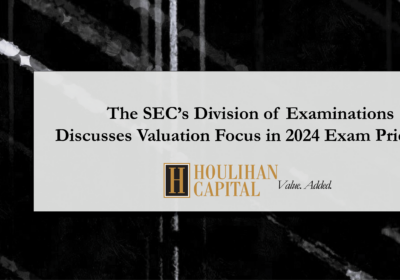Funds, Directors & Fiduciaries – YES, Valuation Matters!
The Securities and Exchange Commission recently settled charges against AlphaBridge Capital Management, which was alleged to have fraudulently inflated the prices of securities in hedge fund portfolios it managed. The SEC investigation found that AlphaBridge told investors and its auditor that it obtained independent price quotes from broker-dealers for certain unlisted, thinly-traded residential mortgage-backed securities, when it instead gave internally-derived valuations to broker-dealer representatives to pass off as their own.
AlphaBridge and its owners Thomas T. Kutzen and Michael J. Carino agreed to pay $5 million combined to settle the charges. Additionally, AlphaBridge and Kutzen are censured, while Carino is barred from working in the securities industry for at least three years.
Regarding the case, Julie M. Riewe, Co-Chief of the SEC Enforcement Division’s Asset Management Unit, commented, “The integrity of the portfolio valuation process is critical to fund investors, especially when it involves illiquid securities.” The case and Riewe’s remarks reflect the SEC’s increased focus recently on curtailing fraudulent valuation schemes at investment advisers and investment companies.
However, the SEC is not only focused on valuation issues within hedge fund portfolios. The valuation practices of alternative mutual funds have drawn increased scrutiny in the last year. Investments in these new investment vehicles, which pursue “alternative” investment strategies traditionally only accessible to private funds, grew by 43% in 2013 thanks to capital from retail investors. Unsurprisingly, the SEC noticed this growth, and its Office of Compliance Inspections and Examination (“OCIE”) officially launched a broad examination of alternative mutual funds (approximately 30 fund companies) in August 2014 to investigate for potential risks and regulatory issues associated with valuation, among other topics.
Unfortunately, the enhanced scrutiny is not likely to abate soon. The OCIE again shone a spotlight on valuation-related issues at alternative mutual funds on January 13, 2015 when it published its examination priorities for 2015. Under the theme of “protecting retail investors and investors saving for retirement,” the OCIE stated a priority would be to continue to assess alternative mutual funds, with a particular focus on valuation practices and certain other factors.
Because alternative mutual funds fall within the purview of the Investment Company Act of 1940, they are forced to fulfill burdensome statutory responsibilities for valuation of securities. Net asset values must be calculated daily, which, in the case of an alternative fund, may require the valuation of derivatives or illiquid assets. As OCIE Director Andrew Bowden said, “The use of hard-to-value and/or illiquid securities in an open-end mutual fund…is fraught with risk.” While Mr. Bowden may have been referring to risk from the perspective of an investor, his comments are as applicable to directors and other fiduciaries related to these alternative funds. When robust valuation policies and procedures are not in place, directors can wind up in a serious legal bind.
The SEC has continued to keep valuation issues front and center. In a speech to the Private Equity Forum of the Practicing Law Institute last year, Norm Champ, then-Director of the Division of Investment Management at the SEC, highlighted five valuation issues fund managers could address to avoid regulatory quandaries:
- The requirement that the fund monitor for circumstances that may necessitate the use of fair value prices;
- The provision of a methodology by which a fund determines fair value;
- The process for price overrides;
- Assurance that controls are in place to review, monitor and approve all overrides in a timely manner; and
- The prompt notification to, and review and approval by, persons not directly involved in portfolio management to mitigate conflicts of interest.
Houlihan Capital concurs and has found that, in addition, the following related best practices can help meet greater investor, auditor and SEC regulation and scrutiny:
- Improving internal systems for retaining and monitoring fund holdings data;
- Establishing an internal pricing committee;
- Maintaining an advisory board or committee;
- Appointing an independent third‐party valuation provider.
An independent third-party valuation provider can review a fund’s valuation policies for compliance issues, provide a validation of the valuation methodology used to price halted or suspended securities, and/or provide clients with independent valuations of assets that minimize regulatory risk.
Houlihan Capital is a leading, solutions‐driven valuation, financial advisory and boutique investment banking firm committed to delivering superior client value and thought leadership in an ever‐changing landscape. The firm has extensive experience in providing fairness and solvency opinions, and objective, independent and defensible opinions of value that meet accounting and regulatory requirements. Our clients include some of the largest asset managers around the world, and private equity funds, hedge fund advisors, fund administrators, and other asset management firms benefit from Houlihan Capital’s comprehensive valuation and financial advisory services. Houlihan Capital is SOC-compliant, a Financial Industry Regulatory Authority (FINRA) and SIPC member, and committed to the highest levels of professional ethics and standards.
For more information on independent third party valuation services, please visit www.houlihancapital.com or contact Paul Clark at 312‐450‐8656.



